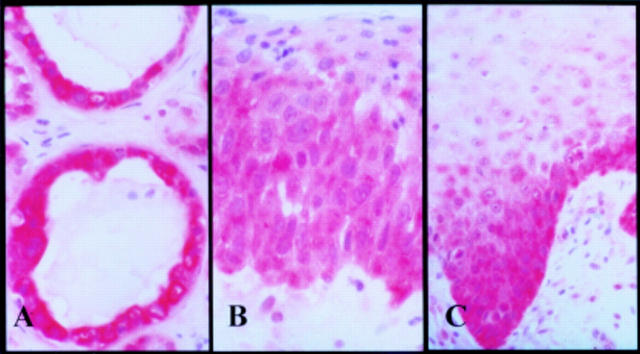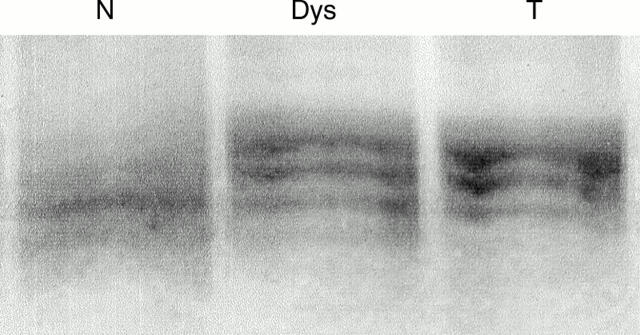Abstract
Aims—To investigate whether anomalies of transforming growth factor ß type II receptor (TGF-ß RII) expression occur in the early stages of laryngeal carcinogenesis and to assess their importance in the development of laryngeal squamous cell carcinoma. TGF-ß RII status was examined in laryngeal premalignant lesions coupled with malignant evolution and compared with a control group of similar lesions without progression to cancer.
Methods—Immunohistochemical staining for TGF-ß RII was performed on 15 paraffin wax embedded biopsies from patients with precancerous laryngeal lesions who subsequently developed invasive squamous cell carcinoma of the larynx, and on 30 control biopsies from patients who did not develop cancer in a comparable follow up period. In addition, DNA extracted from 18 preneoplastic lesions and eight squamous cell carcinomas was amplified by the polymerase chain reaction at the poly A and the poly GT regions of the TGF-ß RII gene.
Results—In the group of lesions with progression to carcinoma, 11 of 15 cases showed loss (< 20% of epithelial cells) of TGF-ß RII immunoreactivity, whereas among non-evolved lesions only five of 30 had similar altered expression of the receptor (p < 0.001, two tailed Fisher's exact test). All squamous cell carcinomas showed a degree of receptor expression comparable with that of the corresponding preneoplastic lesion, with the exception of one case, in which loss of the receptor was evident only in invasive cancer. Mutation of the poly A sequence of the TGF-ß RII gene was identified in only one precancerous lesion and in the subsequent squamous cell carcinoma.
Conclusions—These findings indicate that the downregulation of TGF-ß RII is an early event in laryngeal carcinogenesis, which may result in the loss of TGF-ß mediated growth inhibition, thereby facilitating the progression of laryngeal precancerous lesions to squamous cell carcinoma.
Key Words: laryngeal cancer • transforming growth factor-ß type II receptor
Full Text
The Full Text of this article is available as a PDF (162.7 KB).
Figure 1 (A) Laryngeal mucous glands showing intense immunoreactivity for transforming growth factor ß (TGF-ß) receptor type II. (B) Moderate laryngeal dysplasia with diffuse distribution of TGF-ß receptor type II in the basal and superficial layers of the squamous epithelium. This patient was free of disease five years after this biopsy. (C) Mild laryngeal dysplasia with pronounced loss of TGF-ß receptor type II expression: immunoreactivity is limited to the basal layers of the squamous epithelium. This patient developed a squamous cell carcinoma of the larynx three years later.
Figure 2 Microsatellite analysis of the transforming growth factor ß receptor type II (TGF-ß RII) poly A repeat sequence. Genomic DNA from normal tissue (N), laryngeal dysplasia (Dys), and metachronous squamous cell carcinoma (T) was amplified by PCR, subjected to electrophoresis, and visualised with the silver staining method. Mutant bands are present in laryngeal dysplasia and in the subsequent squamous cell carcinoma.
Selected References
These references are in PubMed. This may not be the complete list of references from this article.
- Chu T. Y., Lai J. S., Shen C. Y., Liu H. S., Chao C. F. Frequent aberration of the transforming growth factor-beta receptor II gene in cell lines but no apparent mutation in pre-invasive and invasive carcinomas of the uterine cervix. Int J Cancer. 1999 Feb 9;80(4):506–510. doi: 10.1002/(sici)1097-0215(19990209)80:4<506::aid-ijc4>3.0.co;2-e. [DOI] [PubMed] [Google Scholar]
- Coffey R. J., Jr, Bascom C. C., Sipes N. J., Graves-Deal R., Weissman B. E., Moses H. L. Selective inhibition of growth-related gene expression in murine keratinocytes by transforming growth factor beta. Mol Cell Biol. 1988 Aug;8(8):3088–3093. doi: 10.1128/mcb.8.8.3088. [DOI] [PMC free article] [PubMed] [Google Scholar]
- Dockhorn-Dworniczak B., Dworniczak B., Brömmelkamp L., Bülles J., Horst J., Böcker W. W. Non-isotopic detection of single strand conformation polymorphism (PCR-SSCP): a rapid and sensitive technique in diagnosis of phenylketonuria. Nucleic Acids Res. 1991 May 11;19(9):2500–2500. doi: 10.1093/nar/19.9.2500. [DOI] [PMC free article] [PubMed] [Google Scholar]
- Eisma R. J., Spiro J. D., von Biberstein S. E., Lindquist R., Kreutzer D. L. Decreased expression of transforming growth factor beta receptors on head and neck squamous cell carcinoma tumor cells. Am J Surg. 1996 Dec;172(6):641–645. doi: 10.1016/s0002-9610(96)00305-4. [DOI] [PubMed] [Google Scholar]
- Furuta K., Misao S., Takahashi K., Tagaya T., Fukuzawa Y., Ishikawa T., Yoshioka K., Kakumu S. Gene mutation of transforming growth factor beta1 type II receptor in hepatocellular carcinoma. Int J Cancer. 1999 Jun 11;81(6):851–853. doi: 10.1002/(sici)1097-0215(19990611)81:6<851::aid-ijc2>3.0.co;2-d. [DOI] [PubMed] [Google Scholar]
- Gallo O., Santucci M., Franchi A. Cumulative prognostic value of p16/CDKN2 and p53 oncoprotein expression in premalignant laryngeal lesions. J Natl Cancer Inst. 1997 Aug 6;89(15):1161–1163. doi: 10.1093/jnci/89.15.1161. [DOI] [PubMed] [Google Scholar]
- Garrigue-Antar L., Muñoz-Antonia T., Antonia S. J., Gesmonde J., Vellucci V. F., Reiss M. Missense mutations of the transforming growth factor beta type II receptor in human head and neck squamous carcinoma cells. Cancer Res. 1995 Sep 15;55(18):3982–3987. [PubMed] [Google Scholar]
- Garrigue-Antar L., Souza R. F., Vellucci V. F., Meltzer S. J., Reiss M. Loss of transforming growth factor-beta type II receptor gene expression in primary human esophageal cancer. Lab Invest. 1996 Aug;75(2):263–272. [PubMed] [Google Scholar]
- Goggins M., Shekher M., Turnacioglu K., Yeo C. J., Hruban R. H., Kern S. E. Genetic alterations of the transforming growth factor beta receptor genes in pancreatic and biliary adenocarcinomas. Cancer Res. 1998 Dec 1;58(23):5329–5332. [PubMed] [Google Scholar]
- Guo Y., Jacobs S. C., Kyprianou N. Down-regulation of protein and mRNA expression for transforming growth factor-beta (TGF-beta1) type I and type II receptors in human prostate cancer. Int J Cancer. 1997 May 16;71(4):573–579. doi: 10.1002/(sici)1097-0215(19970516)71:4<573::aid-ijc11>3.0.co;2-d. [DOI] [PubMed] [Google Scholar]
- Hu P. P., Datto M. B., Wang X. F. Molecular mechanisms of transforming growth factor-beta signaling. Endocr Rev. 1998 Jun;19(3):349–363. doi: 10.1210/edrv.19.3.0333. [DOI] [PubMed] [Google Scholar]
- Kalkhoven E., Roelen B. A., de Winter J. P., Mummery C. L., van den Eijnden-van Raaij A. J., van der Saag P. T., van der Burg B. Resistance to transforming growth factor beta and activin due to reduced receptor expression in human breast tumor cell lines. Cell Growth Differ. 1995 Sep;6(9):1151–1161. [PubMed] [Google Scholar]
- Ki Hong W., Lippman S. M., Hittelman W. N., Lotan R. Retinoid chemoprevention of aerodigestive cancer: from basic research to the clinic. Clin Cancer Res. 1995 Jul;1(7):677–686. [PubMed] [Google Scholar]
- Lazzereschi D., Ranieri A., Mincione G., Taccogna S., Nardi F., Colletta G. Human malignant thyroid tumors displayed reduced levels of transforming growth factor beta receptor type II messenger RNA and protein. Cancer Res. 1997 May 15;57(10):2071–2076. [PubMed] [Google Scholar]
- Lu S. L., Akiyama Y., Nagasaki H., Saitoh K., Yuasa Y. Mutations of the transforming growth factor-beta type II receptor gene and genomic instability in hereditary nonpolyposis colorectal cancer. Biochem Biophys Res Commun. 1995 Nov 13;216(2):452–457. doi: 10.1006/bbrc.1995.2644. [DOI] [PubMed] [Google Scholar]
- Markowitz S., Wang J., Myeroff L., Parsons R., Sun L., Lutterbaugh J., Fan R. S., Zborowska E., Kinzler K. W., Vogelstein B. Inactivation of the type II TGF-beta receptor in colon cancer cells with microsatellite instability. Science. 1995 Jun 2;268(5215):1336–1338. doi: 10.1126/science.7761852. [DOI] [PubMed] [Google Scholar]
- Muro-Cacho C. A., Anderson M., Cordero J., Muñoz-Antonia T. Expression of transforming growth factor beta type II receptors in head and neck squamous cell carcinoma. Clin Cancer Res. 1999 Jun;5(6):1243–1248. [PubMed] [Google Scholar]
- Myeroff L. L., Parsons R., Kim S. J., Hedrick L., Cho K. R., Orth K., Mathis M., Kinzler K. W., Lutterbaugh J., Park K. A transforming growth factor beta receptor type II gene mutation common in colon and gastric but rare in endometrial cancers with microsatellite instability. Cancer Res. 1995 Dec 1;55(23):5545–5547. [PubMed] [Google Scholar]
- Nørgaard P., Damstrup L., Rygaard K., Spang-Thomsen M., Skovgaard Poulsen H. Growth suppression by transforming growth factor beta 1 of human small-cell lung cancer cell lines is associated with expression of the type II receptor. Br J Cancer. 1994 May;69(5):802–808. doi: 10.1038/bjc.1994.158. [DOI] [PMC free article] [PubMed] [Google Scholar]
- Park K., Kim S. J., Bang Y. J., Park J. G., Kim N. K., Roberts A. B., Sporn M. B. Genetic changes in the transforming growth factor beta (TGF-beta) type II receptor gene in human gastric cancer cells: correlation with sensitivity to growth inhibition by TGF-beta. Proc Natl Acad Sci U S A. 1994 Sep 13;91(19):8772–8776. doi: 10.1073/pnas.91.19.8772. [DOI] [PMC free article] [PubMed] [Google Scholar]
- Parsons R., Myeroff L. L., Liu B., Willson J. K., Markowitz S. D., Kinzler K. W., Vogelstein B. Microsatellite instability and mutations of the transforming growth factor beta type II receptor gene in colorectal cancer. Cancer Res. 1995 Dec 1;55(23):5548–5550. [PubMed] [Google Scholar]
- Reiss M., Sartorelli A. C. Regulation of growth and differentiation of human keratinocytes by type beta transforming growth factor and epidermal growth factor. Cancer Res. 1987 Dec 15;47(24 Pt 1):6705–6709. [PubMed] [Google Scholar]
- Reiss M., Stash E. B. High frequency of resistance of human squamous carcinoma cells to the anti-proliferative action of transforming growth factor beta. Cancer Commun. 1990;2(11):363–369. doi: 10.3727/095535490820874029. [DOI] [PubMed] [Google Scholar]
- Uhlman D. L., Adams G., Knapp D., Aeppli D. M., Niehans G. Immunohistochemical staining for markers of future neoplastic progression in the larynx. Cancer Res. 1996 May 1;56(9):2199–2205. [PubMed] [Google Scholar]
- Wang D., Song H., Evans J. A., Lang J. C., Schuller D. E., Weghorst C. M. Mutation and downregulation of the transforming growth factor beta type II receptor gene in primary squamous cell carcinomas of the head and neck. Carcinogenesis. 1997 Nov;18(11):2285–2290. doi: 10.1093/carcin/18.11.2285. [DOI] [PubMed] [Google Scholar]
- de Jong J. S., van Diest P. J., van der Valk P., Baak J. P. Expression of growth factors, growth inhibiting factors, and their receptors in invasive breast cancer. I: An inventory in search of autocrine and paracrine loops. J Pathol. 1998 Jan;184(1):44–52. doi: 10.1002/(SICI)1096-9896(199801)184:1<44::AID-PATH984>3.0.CO;2-H. [DOI] [PubMed] [Google Scholar]




